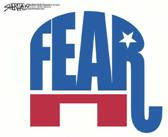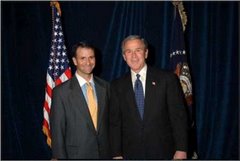"When you privatize profit and socialize risk, it's a prescription for lack of discipline,"
Rep. Jim Leach (R - Iowa), Chairman of the House Banking Committee in the 1990s.
 "This administration is asking for a $700 billion blank check to be put in the hands of Henry Paulson, a guy who totally missed this, and has been wrong about almost everything. It's almost amazing they can do this with a straight face. There is clearly skepticism and anger at the idea that we'd give this money to these guys, no questions asked."
"This administration is asking for a $700 billion blank check to be put in the hands of Henry Paulson, a guy who totally missed this, and has been wrong about almost everything. It's almost amazing they can do this with a straight face. There is clearly skepticism and anger at the idea that we'd give this money to these guys, no questions asked."
Dean Baker, Co-director, Center for Economic and Policy Research in Washington
What the Hell?
I had been attempting to educate myself on the sub-prime mortgage mess ever since Fannie Mae and Freddie Mac were bailed out, but today I gave up. I don't need to know any more than it is WRONG for taxpayers to bear the burden of the colossal financial mess that has its roots in the GOP deregulation madness that has finally come home to roost. No oversight equals no accountability. There are reasons why we are a country of laws - laws that apply to corporations as well as the average Joe. When the free marketeers finally succeeded in getting the government off of their back, they ran their ships into an iceberg, and now they want the government (read: average Joe Taxpayer) to bail them out. I say no way, not on Bush/Cheney/Paulson's terms. Not with this language in the legislation: "Decisions by the Secretary [of the Treasury] pursuant to the authority of this Act are non-reviewable and committed to agency discretion, and may not be reviewed by any court of law or any administrative agency." Talk about a recipe for a disaster.
There has been a piece floating around the internets entitled This is Your Nation on White Privilege, in which the author Tim Wise contrasts differing perspectives on various situations as viewed through a lens of race. This bail out smacks of the ultimate white/corporate/male/wealthy privilege that would never fly if the entity that needed the bail out were African-American working class families who just couldn't come up with the mortgage payment or pay a credit card bill. We know that this is true because there is little discussion of actually helping out the folks who can't pay their mortgages, rather all of the seven hundred billion dollars would go to the corporate fat cats who offered and signed off on those risky loans in the first place. This is a classic case of corporate welfare, and I, for one, hope that Congress calls McBush's bluff on this bail out scheme and "Just says no."
Last week I wrote the following in anticipation of the next shoe to drop, little did I anticipate that the shoe would be not just another shoe, but an Imelda Marcos-sized closet of shoes. A case on point: Fannie Mae and Freddie Mac get major bail-out, then AIG. Who's next? The answer to that question is the entire financial industry, every sub-prime mortgage lender, every hedge fund manager, every speculator, every derivative actor, every short-seller, every fly-by-night CEO and risky banker, every person who is working on Wall Street.
“Fannie Mae and Freddie Mac are so large and so interwoven in our financial system that a failure of either of them would cause great turmoil in our financial markets here at home and around the globe. This turmoil would directly and negatively impact household wealth: from family budgets, to home values, to savings for college and retirement. A failure would affect the ability of Americans to get home loans, auto loans and other consumer credit and business finance. And a failure would be harmful to economic growth and job creation.”
Henry Paulson, Secretary of the Treasury (NYTimes, September 7, 2008)
Some background information for those who are not economists or Security and Exchange Commission insiders:
Set up by the government - but run privately - Fannie and Freddie (Both "government sponsored entities"or GSEs) have been in the business of backing mortgages since 1968. Like any re-insurer that backs up loans, they make it easier for banks to issue riskier mortgages at lower rates. That means more mortgages for more families. Today Frannie and Freddie either own or back up 41% of home mortgages.
The companies ply their business in a number of ways. First, they buy mortgages from banks, savings and loans, and other mortgage lenders, freeing those lenders' cash to make more loans. Fannie Mae and Freddie Mac pay for those mortgage purchases by selling bonds in the public markets. They also guarantee mortgage-backed securities, investments sold on the open market that are backed by pools of thousands of home mortgages. The system is known as the secondary mortgage market.
Both before and after Fannie Mae and Freddie Mac became private companies, the system helped make credit widely available. The companies, which were created by Congress but are owned by investors, suffered more than $9 billion in mortgage-related losses last year, and analysts expect those losses to grow this year. Because they were chartered by Congress, both companies have the implied, if not legally binding, backing of the government. That allows them to sell bonds at lower interest rates in the open market because investors perceive them as safer.
Finally, Fannie Mae and Freddie Mac securities -- their bonds and mortgage-backed securities -- are one of the basic tools of financial-institution spreadsheets in the United States and abroad. U.S. banks buy billions of dollars worth of them a year. Further, because of the perceived safety, federally insured financial institutions can hold high concentrations of the government-sponsored-enterprise securities, well above that allowed of other securities. Those many tentacles into the financial system are the main reason why some -- most prominently Federal Reserve Chairman Alan Greenspan -- have expressed concern about "systemic risk." That is, under their current structures, if Fannie Mae or Freddie Mac falter, the shock to the system could be too great, and the financial risk to the government too heavy, to bear.
Fannie and Freddie do not lend directly to home buyers. Rather, they buy mortgages from banks and other lenders, and thereby provide fresh capital for home loans. The companies keep some of the mortgages they buy, hoping to profit from them, and sell the rest to investors with a guarantee to pay off the loan if the borrower defaults. Because of the widespread perception that the government would intervene if either company failed, they can borrow money at lower interest rates than their competitors. As a result, they have earned enormous profits that have enriched shareholders and managers alike: from 1990 to 2000, each company’s stock grew more than 500 percent and top executives were paid tens of millions of dollars.
Those profits were threatened earlier this decade, however, when new competitors emerged and after audits revealed that both companies had manipulated their earnings. The companies were forced to replace top executives, pay hundreds of millions in penalties and consent to strict growth limits. To keep profits aloft and meet affordable-housing goals set by Congress, the companies began buying huge numbers of subprime and Alt-A mortgages, the highly profitable loans often taken out by low-income and riskier borrowers. By the end of last year, the companies had guaranteed or invested in $717 billion of subprime and Alt-A loans, up from almost none in 2000.
“I want these companies to help with affordable housing, to help low-income families get loans and to help clean up this subprime mess. Otherwise, why should they exist?”
Representative Barney Frank, (D - Massachusetts), Chairman of the House Financial Services Committee.
A report released earlier this month by a regulator, noted that although Freddie and Fannie had a combined $19.9 billion of “unrealized losses” on mortgage-related investments, neither company had reduced its earnings to reflect those declines. That is because they judged the losses to be temporary — in essence wagering that the mortgage market would recover before those assets were sold. Such a wager is permitted by the rules but difficult for outsiders to analyze. Both companies have also recently changed their policies on delinquent loans, which they previously recorded as impaired when borrowers were 120 days late. Now, some overdue loans can go two years before the companies record a loss.
“We’ve taken tremendous risks by loosening these companies’ purse strings. They could cause an economywide meltdown if they got into real trouble and leave the public on the hook for billions.” Senator Mel Martinez, (R - Florida), Former Secretary of Housing and Urban Development. Ah, Senator, more prophetic words have rarely been spoken....
If you want to follow this debacle or send a message to Congress, click here.
Sign Senator Bernie Sanders' Petition to Secretary Henry Paulson.
Read Naomi Klein's excellent piece: Now Is the Time to Resist Wall Street's Shock Doctrine. Ms. Klein was on the Stephanie Miller Show this morning (Wed. Sept. 24, 2008). I recommend listening to the interview (it should be available at StephanieMiller.com later today).
 Soomebody better tell John McCain that sometimes the president needs to walk and chew gum at the same time, in other words, he/she sometimes needs to multitask. However, I am so glad that Grampy McSame decided to rally and join Barack Obama in Oxford, Mississippi for the first presidential debate. A debate in which ole Grampy managed to get through without incessant "blurting out of random crap."
Soomebody better tell John McCain that sometimes the president needs to walk and chew gum at the same time, in other words, he/she sometimes needs to multitask. However, I am so glad that Grampy McSame decided to rally and join Barack Obama in Oxford, Mississippi for the first presidential debate. A debate in which ole Grampy managed to get through without incessant "blurting out of random crap."
































































